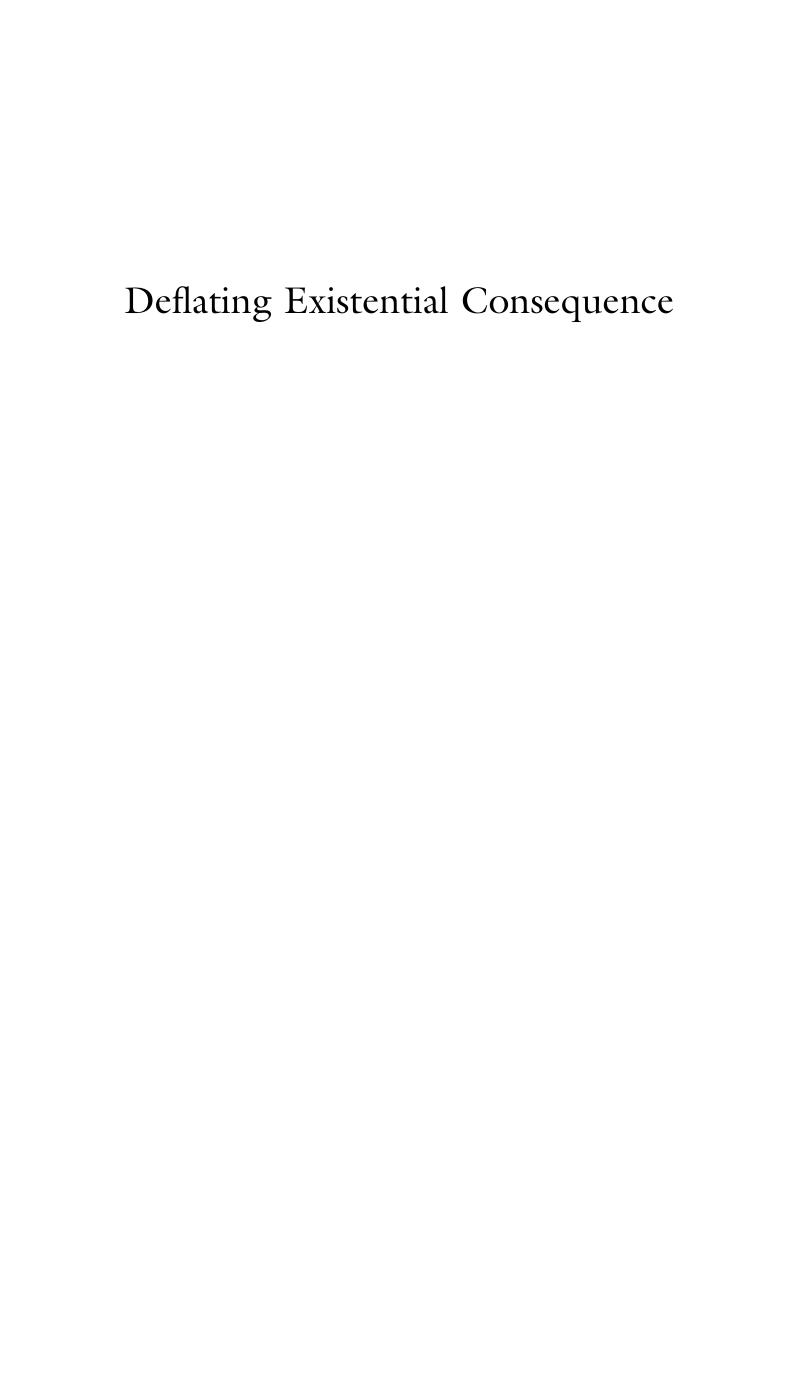Deflating Existential Consequence: A Case for Nominalism by Jody Azzouni

Author:Jody Azzouni [Azzouni, Jody]
Language: eng
Format: epub, pdf
ISBN: 0195159888
10 I succumbed to such a temptation, and pretty much for these reasons, at the end of my 1998. Also, compare Austin 1962, pp. 62-77, and Bennett 1969.
11 I hear echoes of Austin here. See Austin 1962, p. 31.
end p.119
Bishop Berkeley on shows), there is no escaping this by restricting what one "sees" in some precise sense to what's "immediately seen" or what's "really seen." But anyone would be rash to draw ontological conclusions of any sort about the wealth of items ordinary language licenses us as able to see, because innocently included among such items are hallucinations: "I'm seeing elves again," the aging hippie in the grip of an acid flashback will say. "I must have had too much to drink," someone else (under slightly different circumstances) will add, "because there are those pesky pink elephants again. I'm so tired of seeing those things all the time." If we can see more than is dreamt of in the philosophies of nominalists, that's only because we can see more than there is.
Concluding Remarks
Having said all this, I hasten to add that I wear my newly adopted nominalistic garb lightly. This isn't only because I hold that nominalism is a position that can't be adopted for philosophically convincing reasons (but only—at best—on the grounds that the most general intuitions prompting folk ontology tend toward nominalism), but because even with respect to the latter considerations, there is still a question of exactly which promptings of barely conscious folk-ontological intuition we should be swayed by. Raising this issue brings us back to the Opposing Consideration—specifically, to the suggestion that ordinary folk ontologically distinguish mathematical posits from their fictional kin. I'm now going to set aside my qualms about whether "exists" carries ontological commitments in contrast to "there is," and argue that even if this is so, and even if it's clear because of this difference in the usage of "exists" that ordinary people take fictional entities to exist in no sense at all but do take mathematical abstracta to exist, we (philosophers) shouldn't follow suit, despite the fact that there are no definitive philosophical reasons for taking an ontological stand about this, one way or the other.
I've claimed that ontological independence, in the appropriate sense, should be the decisive consideration on which the existence of something should be decided, and I've suggested that folk ontology is with me on this one.12 But the Opposing Consideration suggests that my claim is debatable: that the reason that it intuitively feels more natural to describe mathematical abstracta as existing than it does to so describe Mickey Mouse is because the dark promptings of folk intuition treat mathematical abstracta differently from how they treat fictional entities. I concede this.
Download
Deflating Existential Consequence: A Case for Nominalism by Jody Azzouni.pdf
This site does not store any files on its server. We only index and link to content provided by other sites. Please contact the content providers to delete copyright contents if any and email us, we'll remove relevant links or contents immediately.
| Applied | Geometry & Topology |
| History | Infinity |
| Mathematical Analysis | Matrices |
| Number Systems | Popular & Elementary |
| Pure Mathematics | Reference |
| Research | Study & Teaching |
| Transformations | Trigonometry |
Modelling of Convective Heat and Mass Transfer in Rotating Flows by Igor V. Shevchuk(6426)
Weapons of Math Destruction by Cathy O'Neil(6255)
Factfulness: Ten Reasons We're Wrong About the World – and Why Things Are Better Than You Think by Hans Rosling(4729)
A Mind For Numbers: How to Excel at Math and Science (Even If You Flunked Algebra) by Barbara Oakley(3290)
Descartes' Error by Antonio Damasio(3264)
Factfulness_Ten Reasons We're Wrong About the World_and Why Things Are Better Than You Think by Hans Rosling(3229)
TCP IP by Todd Lammle(3174)
Fooled by Randomness: The Hidden Role of Chance in Life and in the Markets by Nassim Nicholas Taleb(3103)
Applied Predictive Modeling by Max Kuhn & Kjell Johnson(3058)
The Tyranny of Metrics by Jerry Z. Muller(3055)
The Book of Numbers by Peter Bentley(2959)
The Great Unknown by Marcus du Sautoy(2685)
Once Upon an Algorithm by Martin Erwig(2640)
Easy Algebra Step-by-Step by Sandra Luna McCune(2624)
Lady Luck by Kristen Ashley(2574)
Police Exams Prep 2018-2019 by Kaplan Test Prep(2535)
Practical Guide To Principal Component Methods in R (Multivariate Analysis Book 2) by Alboukadel Kassambara(2533)
All Things Reconsidered by Bill Thompson III(2385)
Linear Time-Invariant Systems, Behaviors and Modules by Ulrich Oberst & Martin Scheicher & Ingrid Scheicher(2359)
